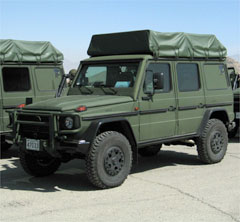
KANDAHAR, Afghanistan (CP) - Four Canadian soldiers were killed Saturday in a roadside bomb explosion in southern Afghanistan, military officials said.
The soldiers' G-Wagon, part of an armoured convoy, was struck by an improvised explosive device (IED).
Three of the soldiers died at the scene, in Shah Wali Kot district of the Kandahar province, 70 kilometres north of Kandahar. A fourth was transported to a Kandahar airfield hospital but died a short time later.
The attack happened at about 7:30 a.m. local time.
The troops were in the region "to establish the legitimate authority of the Afghan government in the area," said Brig.-Gen. David Fraser, commander of Combined Task Force Aegis.
Two of the soldiers were reservists.
The military identified three of the soldiers as Cpl. Matthew Dinning of Richmond Hill, stationed in Petawawa, Ont., Bombadier Myles Mansell of Victoria and Lieut. William Turner, born in Toronto and stationed in Edmonton.
The name of the fourth soldier was not released at the request of his family.
"While we are saddened by their loss, we will not forget them or their sacrifice," said Fraser, calling the soldiers "outstanding Canadians" who believed in what they were doing in Afghanistan.
"We will redouble our efforts in Southern Afghanistan in their memory."
Immediately after the attack, the commanding officer of Alpha company, first battalion of the Princess Patricia's Canadian Light Infantry, led a heavily armed patrol to Gumbad in a show of force meant to demonstrate to the Afghans and the Taliban that the Canadians were not intimidated despite the carnage.
There was no immediate claim of responsibility for the attack, but Canadian military officials blamed Taliban militants.
"We are pretty confident that it was the Taliban and we knew coming in here that they would be targeting us," Maj. Quentin Innis said.
Other military officials met with village elders to try to glean any information he could about who was responsible for the attack.
An investigation has been launched into the attack, said Canadian military spokesman Lieut. Mark MacIntyre. He said no arrests have been made.
At least 16 Canadians have been killed in Afghanistan since 2002.
On March 29, a Canadian machine-gunner and a U.S. National Guard medic were killed in a firefight that lasted for hours in Sangin.
The casualties occurred as the Taliban - in a rare display of conventional military tactics - tried to overrun a remote sandspit of an outpost.
Saturday's bloody assault comes in the wake of a Taliban warning of accelerated attacks against Canadians. A spokesman for the outlawed fundamentalist former government told The Canadian Press this month that the Taliban was counting on the increased casualties triggering a clamour among voters to withdraw Canadian soldiers.
Prime Minister Stephen Harper, who made a surprise visit to Afghanistan his first overseas trip last month, has insisted that Canada will not "cut and run" on its commitment to the country's fledgling democracy.
A recent poll suggested the Canadian public is evenly divided on the presence of its troops in Afghanistan.
Afghan president, Hamid Karzai barely has control beyond his heavily fortified compound. His government would not exist if it weren't being propped up at the point of bayonets fixed on foreign rifles.
Most of Canada's 2,300 troops in Afghanistan are based in Kandahar, where they have taken over security from U.S. forces.
Canadian soldiers were supposed to be part of a NATO-led provincial reconstruction team in Afghanistan's lawless south when they went in last August.
But NATO won't take over command of the reconstruction effort for a few months.
Canadian soldiers are now co-ordinating their efforts with the U.S.-led coalition in its war against terror.
© The Canadian Press, 2006
Picture at top: A Mercedes G-Wagon at Kabul International Airport, 2004. This is the type of vehicle which was involved in roadside bomb explosion in southern Afghanistan, Saturday. (CPimages/Les Perreaux)

No comments:
Post a Comment